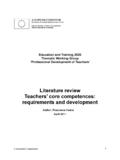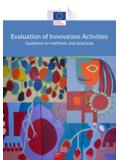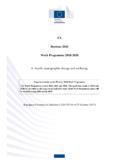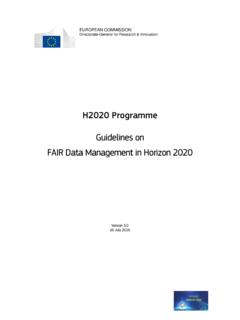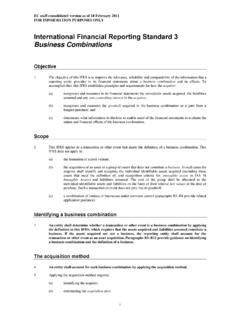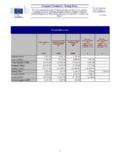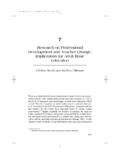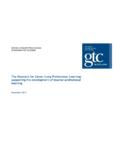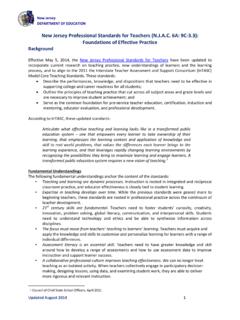Transcription of Teachers’ continuing professional development
1 european commission . Directorate-General for Education and Culture Lifelong learning: policies and programme School education; Comenius Education and Training 2020. Thematic Working Group professional development of Teachers'. Literature review Quality in Teachers' continuing professional development Author: Francesca Caena June 2011. european commission Literature review Quality in Teachers' continuing professional developmenti 1. teacher professional development : Reference the international state of the art The significant, positive correlations between teacher quality and student Angrist & Lavy, 2001;. Darling-Hammond et al., 2005;. achievement, as most important within-school factors explaining Rivkin, Hanushek, Kain, 2005;. performance, and between in-service training and student outcomes, are Rockoff, 2004.
2 Consistently borne out by research. The european Union, focusing on high quality teaching as key pre- Council Resolution 2007/C. 300/07 of ;. requisite for high quality education and training, highlights the school's Council Resolution 2008/C. duty to provide young citizens with the competences they need to adapt 319/08 of to globalised, complex environments, where creativity, innovation, initiative, entrepreneurship and commitment to continuous learning are as important as knowledge. In particular, promoting the development of teachers' competence in teaching transversal competences and heterogeneous classes, and collaborating with colleagues and parents, are seen as essential. Although the complexities of the teaching profession require a lifelong european commission , 2007.
3 OECD, 2005;. learning perspective to adapt to fast changes and evolving constraints or Eurydice, 2009. needs, international studies on teachers and their professional development have shown that so far, in-service training is considered as a professional duty in about a half of all european states, but it is in practice optional in many of them. Incentives to encourage participation in CPD appear few, and penalties for no participation are rare. In accordance with the degree of centralization/ decentralization in national education systems, the responsibility for planning and organizing CPD, falls to schools or local authorities in a certain number of countries (among others, the Netherlands, the UK and Ireland, as well as most Nordic and Eastern european countries).
4 The forms of support to teachers' professional development can consist OECD, 2005. in paid working time and substitutions (often discouraged for budget and organisational reasons), funding of CPD costs sustained by teachers, salary incentives, CPD as condition for salary progression and promotion, national policies and campaigns (such as the recent one in Sweden). An organized plan of support measures for new teachers in the first years OECD TALIS, 2009. of their career - the most demanding and decisive stage of teachers'. development - is foreseen in only a small group of EU countries, among which the UK, Luxembourg and Lithuania seem to have a wide range of support activities. Induction programmes are reported as mandatory in european commission 2. only ten states of the OECD study, with Canada (Quebec), Switzerland and some US states offering the longest support (two years).
5 The form, content and context conditions of teachers' professional development (CPD) are extensively described and analyzed in OECD's recent TALIS survey, focussed on fostering educational performance and effectiveness, outlining key variables for effectiveness in teachers. The survey, which is based on the perceptions and self-reports of lower secondary education teachers, points out that CPD activities appear to be relatively loosely linked with school practices in the areas of instruction, evaluation and feedback, and school leadership; this seems to recommend policies aimed at a stronger integration of different functional domains of schooling. In the following literature review, professional development is defined, in accordance with the perspectives of several studies taken into account by the TALIS survey, as related to activities developing an individual's skills, knowledge, expertise and other characteristics as a teacher (excluding Initial teacher Education).
6 2. Educational effectiveness research and teacher professional development : an overview Diagram: Layers of analysis in identifying contents and forms of teachers' professional development , from Teachers'. professional development : Europe in international comparison, a secondary analysis based on the TALIS dataset. Ed.: Jaap Scheerens. european commission , Luxembourg 2010. Literature on educational effectiveness seems to outline a conceptual framework that can be described as an onion-rings' model, going from the micro-level to the macro-level perspective with individual teachers' Clarke & Hollingsworth, 2002;. european commission 3. personal characteristics (competences, beliefs and attitudes) at the core, Richardson & Placier, 2001. a second layer concerning teaching effectiveness in the classroom (instructional repertoires), a further layer about teachers' cooperation in school contexts, and finally considering national policies and organizational features (including issues of autonomy, accountability, evaluation in education systems) as the outer layer.
7 The literature mentioned here is focused mainly on policy-amenable Anderson et al., 2000;. Putnam & Borko, 2000;. effectiveness features, considering the most favourable conditions for Sleegers, Bolhuis & Gejsel, 2005;. teachers' professional learning, above all in school contexts as ten Dam & Blom, 2006. professional communities. Such a perspective takes stock of past failures of CPD programmes informed by a deficit-mastery model, consisting in one-shot' professional development approaches, adopting instead a change as professional learning' perspective, inspired by adult learning and situated cognition theories, according to the paradigm of the teacher as reflective practitioner, taking responsibility for learning to improve the quality of professional performance.
8 A shift can therefore be distinguished from a technical-rational-top-down approach to CPD, towards a more cultural-individual interactive approach to the professional development of teachers. Since not all the learning of teachers promotes professional development Geijsel et al., 2009;. Janssen & van Yperen, 2004;. in practice and school improvement, existing literature gives some Kwakman, 2003;. indications about key professional learning activities that enable teachers Runhaar, 2008. to tackle rapid changes: keeping updated; experimentation; reflective practice; knowledge sharing; innovation. As regards conditions affecting teacher learning, two theoretical Coburn, 2004;. Earl & Katz, 2006;. perspectives are usually taken into account: Nguni, Sleegers & Denessen, 2006.
9 - psychological factors ( teacher cognition and motivation); Sleegers, Geijsel & van der Berg, 2002;. - organisational factors (leadership, teacher collaboration, staff Toole & Louis, 2002;. relationships and communication, locus of control, opportunities for Zwart, 2007. teachers' learning). The latter factors are considered as prerequisites for linking teacher professional development and school development . The second theoretical perspective often refers to system theory on change, linking structural, cultural and political dimensions of school workplace environments to professional learning. Scholars stress the need for research considering the interplay of the two Geijsel et al., 2009;. Kwakman, 2003. perspectives - psychological factors, together with leadership and organisational conditions - deploying multi-level models.
10 The few existing studies seem to show that psychological factors have relatively large effects on teacher learning, mediating the influence of leadership and organisational conditions. european commission 4. Consistently with the recent learning and cognition theories mentioned Mitchell & Sackney, 2000;. Stoll et al., 2006. before, researchers have highlighted the importance of teachers'. empowerment through collaboration, as well as the development of school cultures valuing shared responsibilities and values, revolving around the concept of professional learning community (PLC). Scholars converge on describing some features of professional learning communities (PLCs), characterized by dimensions such as the focus on student learning, shared values, collective responsibility, reflective professional inquiry, collaboration, group and individual learning.
